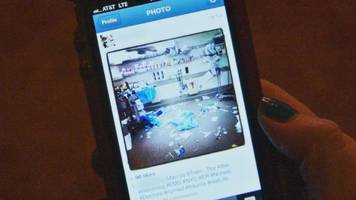![The Government vs. the People: Rebuilding Trust in the Midst of the Illegal Alien Tsunami]()
A bad case of whiplash. That’s what it feels like watching the Obama Administration talk about immigration enforcement.
Two weeks ago, Obama told ABC News that most of the recent illegal border crossers would be sent home. Then on Sunday, Homeland Security Secretary Jeh Johnson refused to answer straightforward questions about deporting them. And now as the President seeks an additional $3.8 billion from Congress to deal with the crisis, the White House is trying to convince us anew that they are serious about enforcement. Right, and if you like your health insurance plan, you can keep it.
“The immigration system is broken.” If only I had a dollar for the number of times politicians or pundits have used this meaningless cliché. Of course, what's really "broken" is the trust between the American people and their leaders. After years of failing to enforce immigration law, the voters correctly do not believe that the politicians are telling them the truth.
Our government threatens Border Patrol and healthcare workers who want to tell the truth about this new crop of illegal aliens. It restricts media access and reporting on the detention facilities. Recently we learned it set free 36,000 criminal aliens, including rapists, kidnappers, arsonists, burglars, sex offenders, and car thieves. Both Republicans and Democrats warn about the threat posed by ISIS after it overran Iraq’s borders but are strangely silent as our own borders are swamped. These same pols hang on every word of pro-amnesty billionaires, who enjoy lives of solitude behind their own high walls and locked gates. Meanwhile, when we raise our own voices in protest, we are branded as racists and xenophobes. And we’re supposed to trust these people?
Until this relationship is repaired, it will be extremely difficult to rally support for any immigration plan whatsoever. So what concrete steps can the Administration take and the GOP support to shrink this trust deficit? Here’s a start:
1. Start deporting people. Far from being cold-hearted or “draconian,” deportations will save lives and restore much-needed credibility to the U.S. immigration system. The thousands of illegals who risk their lives and those of their minor children to cross our southwest border are doing so in large part because they believe once here, they will not be sent back. Here is where Obama’s actions speak louder than his words. Contrary to the Administration’s claim of toughness on deportation, interior removals have dropped by 40 percent over the past three years. In 2013, for instance, Obama’s Administration deported less than 0.2 percent of illegal aliens who had not committed a major crime. As John Sandweg, Obama’s former director of Immigration and Customs Enforcement, told the Los Angeles Times in April: “If you are a run-of-the-mill immigrant here illegally, your odds of getting deported are close to zero.” No surprise that a plurality of Americans in the latest Rasmussen poll believe President Obama helped create the current crisis.
2. Halt foreign aid, work, and tourist visas for any country that refuses to assist in the repatriation of its citizens who have entered our country illegally. Ditto for countries that facilitate the transport of illegals to the U.S., as Mexico is currently doing. In egregious cases, we should consider suspending trade agreements and freezing the bank accounts of the political leaders of offending nations. If you abuse your relationship with America by effectively dumping your low-skilled workers here, you should suffer the economic consequences.
3. Order U.S. financial institutions to stop remittances illegal immigrants wire back to their home countries. For decades, other nations have enjoyed the economic benefit of money made illegally here but sent there. Last year, remittances topped a whopping $51 billion, and almost half of that went to Mexico. The best way for people to fix their own countries is to work in their home countries and fight for political reforms there. The incentive to come here illegally will be greatly reduced if they can’t transfer money out of the country.
4. End birthright citizenship. The citizenship clause of the 14th Amendment was never meant to require automatic citizenship to infants born here where neither parent is a U.S. citizen. Even Harry Reid has railed against this absurdity. Every day, women in their 3rd trimesters of pregnancy travel to the U.S. from China, Mexico, and beyond to deliver their new U.S. citizen babies—and gain unlimited access to U.S. welfare. Once their infants get U.S. passports, they know that there is little political appetite to deport that child’s family (see Step 1 above). One need only Google the words “birth tourism” to see how out of hand the situation has become. Canada and the U.S. are the only two developed countries that allow birthright citizenship; the U.K., Australia, Ireland, New Zealand are among the dozens of other countries that have done away with it.
5. Inflict severe penalties against companies that hire illegal aliens. E-verify should make the system rather simple to administer. If you can’t get legal workers to do your field or roofing work at the wage you’re offering, raise the wage. If you cannot make a profit without breaking the law, you should go out of business and make room for someone who can.
6. Deny privileges of citizenship and legal immigrant status to immigration lawbreakers. No Obamacare, food stamps, welfare, disability payments, driver’s licenses, apartment rental contracts, mortgages, or bank accounts.
7. Lifetime ban of returning to America for illegal aliens who use stolen Social Security numbers or other fraudulent identification. These people should be in a fast-tracked deportation proceeding, then sent home.
8. Pass legislation to amend the George W. Bush-era human trafficking law that made it exceedingly cumbersome to deport unaccompanied minors to countries without contiguous borders.
9. Increase the number of ICE officers (the agency responsible for deportation) and grow ICE resources (which have been long neglected) in order to expedite removals and reduce new arrivals. In addition, deploy the forces necessary to enforce the border. Work with border states and local governments to accomplish this common goal. If that means mobilizing the National Guard, so be it.
10. Finish the border fence. As Israel has demonstrated, properly constructed and monitored fences work.
11. Streamline adoptions from countries such as Guatemala for qualified U.S. families. I know what you’re saying—how does this relate to immigration? It directly relates to the abiding concern we have for innocent orphaned children trapped in a system that doesn’t adequately attend to their needs. Thousands of otherwise indigent and abandoned children are waiting to be adopted throughout Central America. As someone who has spent time a good deal of time in El Salvador and Guatemala going back to the mid-'80s, I am acutely aware of how desperate the situation remains for millions in the region.
My experience in Guatemala is part of what drove me to adopt my daughter Maria from an orphanage there 6 years ago. Since then, international adoptions from Guatemala have slowed to a trickle, with many families heartbroken after years of waiting to bring their adoptive children home. When loving families are willing to open their hearts and homes to abandoned children, we should as a nation support that. Senators Mary Landrieu and Roy Blunt have worked tirelessly on this issue; let’s rally behind their efforts.
I don’t pretend to have all the answers on immigration, but I do know that the American people deserve and demand better. Six in ten Americans now believe that the American Dream is out of reach. While the rich get richer, most middle-income earners see prices for basic necessities skyrocketing as their incomes flat-line. It’s no wonder that recent polling shows that Americans want less immigration—even as legislators are promoting endless increases to the number of foreign workers imported into the nation. Yet, up to now, their desire seems to fall on deaf ears.
Until both parties rebuild the trust they so cavalierly squandered on immigration, there is no sense in trying to pass an immigration deal of any kind. It’s time for our political class to start valuing our Constitution and the well-being of their own citizens over the big business lobby, immigration activists, or their own political futures.
Laura Ingraham is the host of the nationally syndicated radio program The Laura Ingraham Show. She is a regular Fox News contributor and the principal substitute host on The O'Reilly Factor. Follow her on Twitter @IngrahamAngle.
Reported by Breitbart 7 hours ago.
 A bad case of whiplash. That’s what it feels like watching the Obama Administration talk about immigration enforcement.
A bad case of whiplash. That’s what it feels like watching the Obama Administration talk about immigration enforcement.  NYC Nurse Fired Over ‘Man vs 6 Train’ Instagram Post
NYC Nurse Fired Over ‘Man vs 6 Train’ Instagram Post






